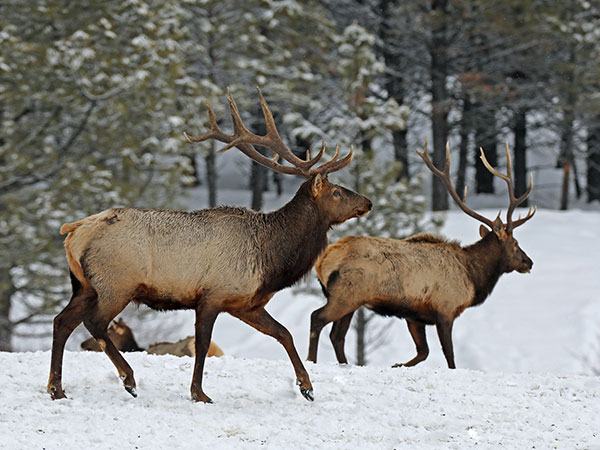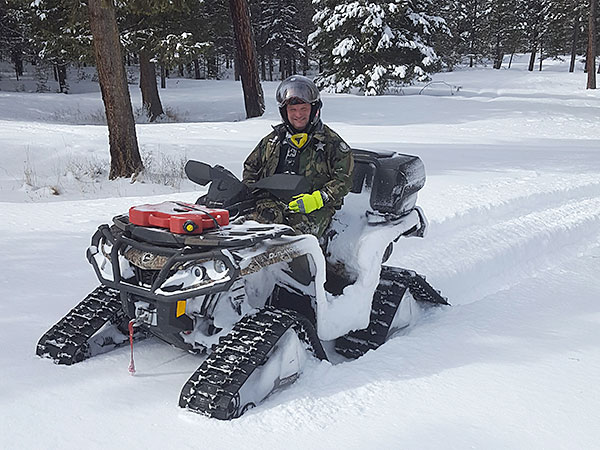Fish Report for 3-21-2019
Winter Weakens, Spring Kills: Late Snow Creates Tough Conditions for Big Game so Consider Delaying Shed Hunting This Year

by ODFW
3-21-2019
Website
SALEM, Ore.—In January, deer and elk in Oregon were in good body condition, and it looked like another mild winter for the state. Then came February.
“We got two feet of snow in 24 hours here in central Oregon, and then another foot over the next 36 hours,” said Rob Tanner, co-founder and president of Oregon Shed Hunters, a group created to preserve the sport and promote ethical shed hunting. “It’s as much snow as I’ve seen in the 20 years I’ve lived here.The local animals that I have been seeing are struggling,” he added.
At this time of year, deer and elk are in taking in little nutrition, relying on their body reserves and what forage they can get to under the snow and outer crust of ice. Being forced to make extra movements in response to dog, vehicle or human disturbance weakens them further, using up what little energy they have left. Even in years with more typical winter weather patterns, most winter mortality of deer and elk occurs in March and April—or as wildlife biologists put it, “Winter weakens, spring kills.”
ODFW is conducting its annual herd composition surveys the next few weeks and will know more about over-winter survival of big game later this spring. But already it’s clear that deer and elk will be especially vulnerable to stress during early spring this year—making responsible shed hunting even more critical.
ODFW wildlife biologists are encouraging shed hunters to be considerate of big game and even delay their search this year. “Our winter ranges are still covered in snow and deer are having a difficult time, so I encourage shed hunters to wait until after snow melts and even after green-up has started,” said Deschutes District Wildlife biologist Corey Heath. “Most antlers are buried now anyway.”
Oregon Shed Hunters agrees. “Our recommendation is that given the late storm and late pressure on animals, to hold off on shed hunting until the snow melts and give the animals time to disperse and access feeding areas,” said Tanner.
More about shed antlers and rules for hunting them in Oregon
Oregon’s buck deer shed their antlers from late December through March. Elk started shedding in late February and will continue into April. Shed hunters collecting these antlers, especially in early spring when deer and elk are at their most vulnerable, need to follow these rules:
Avoid disturbing big game animals: Don’t approach animals.
Respect winter range and road closures: Several wildlife areas (Elkhorn, Ladd Marsh, P.W. Schneider, Wenaha, White River) are closed until early to mid-April, and other winter range areas in central and northeast Oregon are closed or have travel restrictions. See the 2019 Oregon Big Game Regulations for details, http://www.eregulations.com/oregon/19orhd/regulations-wildlife-areas-refuges-special-areas/
Keep vehicles on open roads—or travel by foot or horseback. The ground will be especially water-logged this year and off-roading in the wrong place will damage critical wildlife and fish habitat.
Don’t be in the same spot every day. Deer and elk might need to be in that spot for food or cover, and your presence will keep them from it.
Keep dogs under your control (and leashed at ODFW wildlife areas). Don’t let dogs approach or follow wildlife. State law prohibits dogs (and people) from harassing wildlife. Reminder that dogs must be leashed at ODFW wildlife areas except when hunting game birds, in a posted dog training area, or in a parking area, campground or road open to vehicle traffic.
Don’t trespass on private property. You always need permission to be on private land. Antlers that are shed on private land belong to the landowner under Oregon statutes.
Know what you can keep: Only naturally shed antlers of deer and elk may be kept. Antlers attached to skulls may not be collected.
Oregon State Police Fish and Wildlife Troopers are conducing winter range patrols, using multiple resources such as ATVs, trail cameras and aircraft, to protect deer and elk during this critical time from both poachers and shed hunters violating road closures. Last year, they issued 41 citations and 41 warnings for various wildlife offenses from November-March on winter range.
“Limiting disturbance to big game on winter range is critical for their over-winter survival and it’s an enforcement priority for us this time of year,” said Craig Heuberger, Lieutenant, Oregon State Police Fish and Wildlife Division. Some states concerned about shed hunters’ impact on big game have put seasons in place. Oregon currently has no specific season or plans to implement one, but wildlife managers share concerns about disturbances to big game.
Contact:
Michelle Dennehy
(503) 931-2748
Photos
More Reports
Highlights From this Week’s Recreation Report

3-14-2019
New phone line for reporting 2018 hunts The deadline to report all 2018 big game and turkey tags has been extended...... Read More
OR Department of Fish & Wildlife Reports
for Wednesday, March 13th, 2019
Alsea River: The Lower River Has Been in Good Shape
Kilchis River: Light Gear and Stealthy Presentations Will be Key
: Nehalem Will be in Good Shape this Week
Nestucca River: Nestucca River Fishing Report
Trask River: Trask River Fishing Report
Wilson River: Wilson River Fishing Report
Clackamas River: Winter Steelhead Fishing is Picking Up
Sandy River: Sandy River Fishing Report
Santiam River ( North Fork) Above Detroit Lake: Santiam River Fishing Report
Santiam River (South Fork): Over 9,000 fish Have Navigated Up Willamette Falls
Willamette River: Spring Chinook Fishing is Underway

Website Hosting and Design provided by TECK.net



